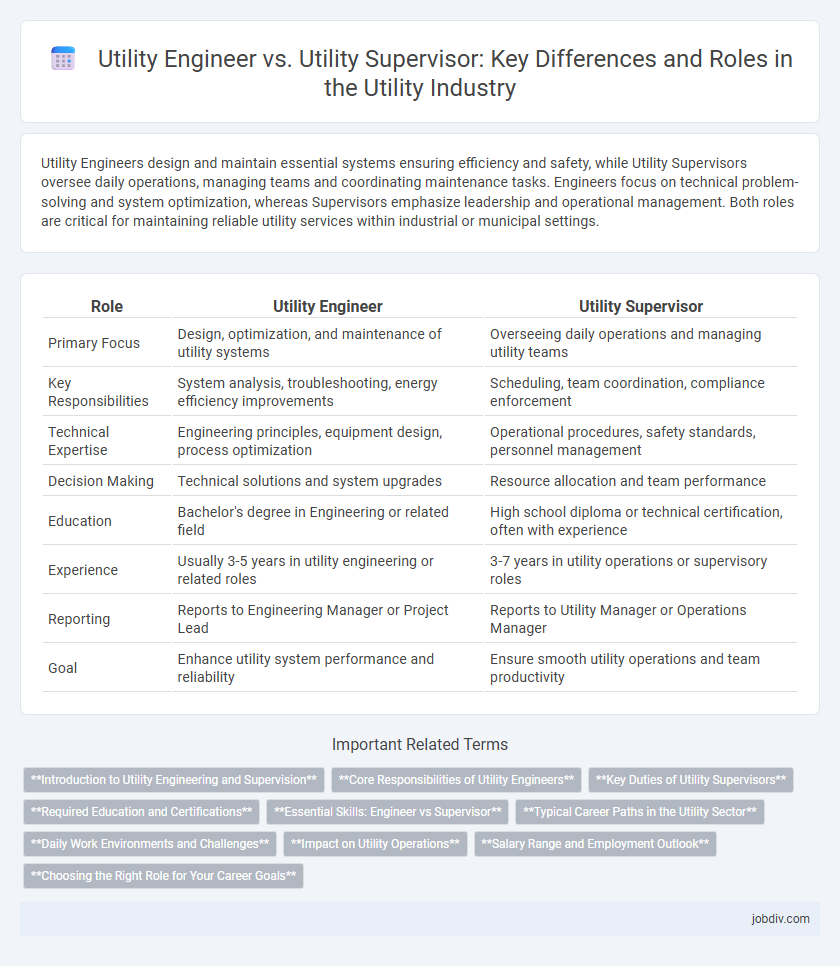Utility Engineers design and maintain essential systems ensuring efficiency and safety, while Utility Supervisors oversee daily operations, managing teams and coordinating maintenance tasks. Engineers focus on technical problem-solving and system optimization, whereas Supervisors emphasize leadership and operational management. Both roles are critical for maintaining reliable utility services within industrial or municipal settings.
Table of Comparison
| Role | Utility Engineer | Utility Supervisor |
|---|---|---|
| Primary Focus | Design, optimization, and maintenance of utility systems | Overseeing daily operations and managing utility teams |
| Key Responsibilities | System analysis, troubleshooting, energy efficiency improvements | Scheduling, team coordination, compliance enforcement |
| Technical Expertise | Engineering principles, equipment design, process optimization | Operational procedures, safety standards, personnel management |
| Decision Making | Technical solutions and system upgrades | Resource allocation and team performance |
| Education | Bachelor's degree in Engineering or related field | High school diploma or technical certification, often with experience |
| Experience | Usually 3-5 years in utility engineering or related roles | 3-7 years in utility operations or supervisory roles |
| Reporting | Reports to Engineering Manager or Project Lead | Reports to Utility Manager or Operations Manager |
| Goal | Enhance utility system performance and reliability | Ensure smooth utility operations and team productivity |
Introduction to Utility Engineering and Supervision
Utility Engineers design, implement, and maintain essential infrastructure systems such as water, gas, and electricity, ensuring efficient operation and compliance with safety standards. Utility Supervisors oversee daily operations, manage maintenance teams, and coordinate repairs to maintain uninterrupted utility services. Both roles require strong technical knowledge, but engineers focus on system planning and optimization, while supervisors emphasize operational management and staff coordination.
Core Responsibilities of Utility Engineers
Utility Engineers primarily focus on designing, maintaining, and optimizing utility systems such as water, gas, and electricity to ensure efficient resource management and regulatory compliance. They analyze system performance data, troubleshoot technical issues, and implement improvements to enhance operational reliability and reduce costs. Utility Engineers collaborate closely with equipment manufacturers and contractors to oversee installation, testing, and commissioning of utility infrastructure.
Key Duties of Utility Supervisors
Utility Supervisors oversee the daily operations of utility systems, ensuring efficient distribution of water, gas, or electricity while managing maintenance schedules and compliance with safety standards. They coordinate work crews, monitor system performance, and troubleshoot issues to minimize downtime and service disruptions. Proficient in regulatory requirements and resource management, Utility Supervisors ensure operational reliability and optimize team productivity across infrastructure projects.
Required Education and Certifications
Utility Engineers typically require a bachelor's degree in electrical, mechanical, or civil engineering, along with professional engineering (PE) licensure for advanced roles. Utility Supervisors often need a high school diploma or associate degree, complemented by certifications such as OSHA safety training, utility line worker certification, or supervisory management credentials. Both roles benefit from continuous education in utility systems, safety protocols, and industry-specific software tools to ensure regulatory compliance and operational efficiency.
Essential Skills: Engineer vs Supervisor
Utility engineers require strong analytical skills, proficiency in technical software, and expertise in system design and troubleshooting to optimize utility services. Utility supervisors emphasize leadership abilities, team management, and effective communication to coordinate operations and ensure adherence to safety regulations. Both roles demand knowledge of utility regulations, but engineers focus more on technical problem-solving while supervisors prioritize operational oversight.
Typical Career Paths in the Utility Sector
Utility Engineers typically begin their careers with degrees in electrical or mechanical engineering, progressing through roles in design, project management, and system analysis before advancing to supervisory positions. Utility Supervisors often have extensive field experience combined with technical knowledge, overseeing daily operations, managing maintenance teams, and ensuring compliance with safety regulations. Career progression in the utility sector may lead Utility Engineers to senior engineering or technical specialist roles, while Utility Supervisors can advance to operations management or utility director positions.
Daily Work Environments and Challenges
Utility Engineers typically engage in technical problem-solving, system design, and maintenance scheduling within dynamic operational settings, ensuring reliable utility services such as electricity, water, and gas. Utility Supervisors manage daily field operations, oversee crews, and handle immediate troubleshooting, prioritizing safety and swift resolution of service disruptions. Both roles face challenges like equipment failures, regulatory compliance, and adapting to evolving technology, but supervisors emphasize real-time decision-making under pressure while engineers focus on long-term system optimization.
Impact on Utility Operations
Utility Engineers optimize system performance through data-driven analysis and implementation of technical solutions, enhancing efficiency and reliability of utility infrastructure. Utility Supervisors oversee daily operational activities, ensuring compliance with safety standards and coordinating maintenance schedules to minimize service disruptions. Their combined impact drives operational excellence by integrating strategic planning with hands-on management in utility systems.
Salary Range and Employment Outlook
Utility Engineers typically earn between $70,000 and $110,000 annually, reflecting their technical expertise in designing and maintaining utility systems, with job growth projected at 5% over the next decade due to infrastructure upgrades. Utility Supervisors command higher salaries ranging from $85,000 to $130,000, driven by their leadership roles in managing utility operations and teams, with employment opportunities growing at a slightly faster pace of 6% as utilities modernize. Both roles benefit from increasing demand for skilled professionals in water, gas, and electric utilities amid expanding renewable energy integration and regulatory compliance.
Choosing the Right Role for Your Career Goals
Utility engineers design and optimize systems for efficient energy and water distribution, requiring strong technical skills and problem-solving abilities, while utility supervisors focus on managing teams, maintenance schedules, and operational safety to ensure continuous service delivery. Choosing the right role depends on whether you prefer hands-on engineering tasks or leadership responsibilities in utility management. Align your career goals with the role that leverages your strengths in either detailed technical expertise or team coordination and operational oversight.
Utility Engineer vs Utility Supervisor Infographic

 jobdiv.com
jobdiv.com